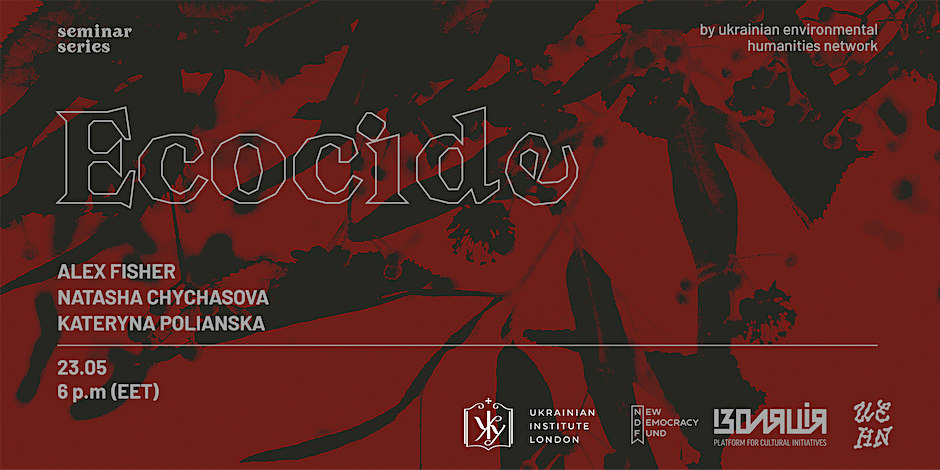Ecocide

In this first seminar, it was discussed the linkages between genocide and ecocide practiced by the Russian Federation in Ukraine. The seminar was joined by Alex Fisher, Natasha Chychasova, and Kateryna Polianska.
[youtube=Z1f-qaSXt18]
The Ecological Park at the Chemical Plant
When Ukraine declared independence, it inherited an arsenal of Soviet-produced nuclear and conventional weapons. Vast sums of these weapons have been subject to industrial demilitarization in the decades that followed. In his talk, Alex addressed the formation of an ecological park on the territory of a defense enterprise responsible for demilitarizing Intercontinental Ballistic Missile rocket motors and PFM-1 'petal' mines — the topic of a zine published by Neveselka (Yevhenii Obraztsov, Anastasiia Omelych) in May 2023.
Alex Fisher is a writer and curator from Buffalo, New York. In May 2023, he will graduate with a master's in Design Studies (Domain: Narratives; Trajectory: Power and Place) from Harvard University. His research interests are in (re)formations of legacy and the mutual associations of natural, built, and political environments in formerly socialist contexts. He received his bachelor's from the University of Pennsylvania, where he majored in Economics and History of Art. In 2019-2020, he served as a Fulbright Student Research Fellow in Ukraine, during which he conducted fieldwork and organized artistic programs in cooperation with a wide range of public and private cultural platforms.
How a butterfly's wings stirred up the world
The famous metaphor of mathematician Edward Lorentz can clarify many regularities of the modern world. After all, this world is a network of complex and heterogeneous connections: of space and time, of centre and periphery — a world where everything is interconnected. Food is a basic human need that must be provided by the global food security system. However, with the beginning of Russia's full-scale invasion of Ukraine and the blockade of the Black Sea ports, which were the main route for Ukrainian grain exports, people in many countries worldwide are facing the threat of starvation. In this example, we see how food shortages lead to political famine, and thus are an instrument of control over people. Ukrainian grain and harvesting have become agents of resistance against violence. They demonstrate that there are no local conflicts in the global world.
Natasha Chychasova is a curator and researcher from Donetsk, based in Kyiv. She works on post-Soviet legacy, and strategies for its deconstruction, and on feminist art practices. Chychasova graduated with a master's program in art history from Taras Shevchenko National University of Kyiv. Currently, she works as a head of the contemporary art department at the National Art and Culture Museum Complex "Mystetskyi Arsenal", Kyiv. Her curatorial projects include: Finally, We're Here! (Gorzów Wielkopolski, Poland, 2019); By Memory (Odesa, Ukraine, 2019); This Is Not a Museum, This Is a Plant (Dnipro, Ukraine, 2020); Non-Human Trilogy (Kyiv, Ukraine, 2020); Letter to Mother (Kyiv, Ukraine, 2020); Silence féminin (2020—2022); Ukraine Ablaze Platform (2022); Heart of Earth (2022); Forms of Presence (2023). Her articles were published in Your Art, ArtsLooker, SHUM magazine, Blok magazine, and Spaika Media.
The impact of military actions on the environment of Ukraine
This report highlights the various types of impact military actions have had on the natural complexes of Ukraine. In particular, the impact on the ground cover, flora and fauna, water components, air, and nature conservation areas will be discussed.
Kateryna Polianska is an environmental scientist in the International Charitable Organization «Environment-People-Law» based in Kyiv, Ukraine. Kateryna gained a PhD in Physical Geography, Geophysics and Geochemistry of Landscape from Taras Shevchenko Kyiv National University in Ukraine with a dissertation entitled: Landscapes of Desna River Valley as Environment and Objects for Conservation of Nature. She is an expert on geo-ecological issues, landscape studies, conservation biology, writing analytical documents, research of the river valleys' nature, protection of the wild animals, development of the Emerald Network — a network of international protected areas, and ecological education. Her responsibilities: counselling citizens on issues of environmental protection, researching anthropogenic factors on the environment, scientific assistance to lawyers in handling EPL court cases, participation in the environmental impact assessment procedure and strategic environmental assessment, protecting valuable natural areas, the study the impact of hostilities on the environment, calculation of losses due to war and methods of restoration of natural areas.
The Ukrainian Environmental Humanities Network was launched in 2022 by Dmytro Chepurnyi, Karolina Uskakovych, Jonathon Turnbull, Oleksandra Pogrebnyak, and Ewa Sułek. The network brings together scholars, researchers, artists, curators, designers, scientists, and more who are interested in Ukraine's more-than-human landscapes and ecologies.
The project is implemented with support from the New Democracy Fund implemented by the Danish Cultural Institute.